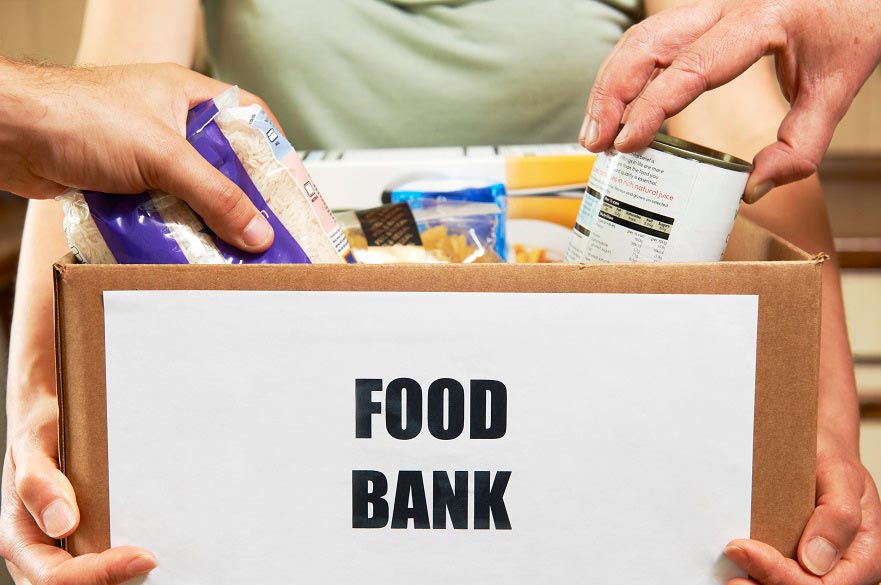Foodbank use should be used to measure the impact of poverty as part of United Nations visit
The number of people using foodbanks should be used to measure how poverty affects the lives of children and families living in the UK, according to a report.
By Helen Breese | Published on 13 November 2018
Categories: Press office; Nottingham Civic Exchange; School of Social Sciences;

It also suggests that foodbanks should be visited as a way of gathering insight into the lives of people experiencing extreme poverty in the UK.
The report - by Dr Mhairi Bowe and Dr Juliet Wakefield at Nottingham Trent University and Nottingham Civic Exchange – has been submitted as evidence to Professor Philip Alston, the United Nations special rapporteur on extreme poverty and human rights.
Professor Alston is currently on a fact-finding visit in the UK to explore links between poverty and human rights in the UK.
The report includes a set of recommendations on the issues Professor Alston should consider during his visit, based on research showing that foodbanks can shed light on the impact of poverty, austerity, and government policies in society.
They include identifying why people are using foodbanks to look at the impact of poverty on people’s lives, and collecting data from foodbanks in parts of the country where Universal Credit has been rolled out and comparing it to areas where the roll out is ongoing, such as Nottinghamshire.
Another recommendation is using accounts of food insecurity as an indicator of the extent of the poverty, low income, and the impact of the benefits system in the UK.
The recommendations are drawn from data collected from a larger research project by Dr Bowe and Dr Wakefield, looking at the stigma foodbank users face and how social interactions between community volunteers can help them to overcome this.
As part of the study, 18 foodbank users and 12 foodbank volunteers from Nottinghamshire were interviewed about their foodbank experiences.
The study found that the non-judgemental methods used by volunteers to provide help meant isolated and desperate foodbank users experienced much-needed social contact, as well as practical and emotional support.
Dr Mhari Bowe and Dr Juliet Wakefield, of the university’s School of Social Sciences, said: “Our research aims to explore the lived experiences of vulnerable people in our society. We believe this issue is of real importance because it highlights the staggering extent of food insecurity in Nottinghamshire.
“We suggest that listening to the accounts of foodbanks users and volunteers provides valuable opportunities to gain insight into broader experiences of poverty and the impact of austerity.
“For this reason, we are pleased that Professor Alston is visiting foodbanks across the United Kingdom as part of his visit, as recommended in our report.”
Nottingham Civic Exchange
Nottingham Civic Exchange has been established by Nottingham Trent University to maximise research, policy and practical impact by bringing together university expertise with partners seeking to address the needs of communities. Nottingham Civic Exchange acts as a resource to look at social and economic issues in new ways. This means facilitating debate, acting as a bridge between research and policy debates, and developing practical projects at a local, city and regional level.
Visit our website - www.ntu.ac.uk/nce Contact us - notts.civicex@ntu.ac.uk Follow us - @NottsCivicEx
Notes for Editors
Press enquiries please contact Helen Breese, Public Relations Manager, on telephone +44 (0)115 848 8751, or via email.
Nottingham Trent University (NTU) was named University of the Year 2017 at the Times Higher Education Awards, and Modern University of the Year in the Times and Sunday Times Good University Guide 2018. These awards recognise NTU for its high levels of student satisfaction, its quality of teaching, its engagement with employers, and its overall student experience. NTU has been rated Gold in the Government’s Teaching Excellence Framework – the highest ranking available.
NTU is one of the largest UK universities. With 30,000 students and more than 4,000 staff located across four campuses, the University contributes £900m to the UK economy every year. It is one of the UK’s most environmentally friendly universities, containing some of the sector’s most inspiring and efficient award-winning buildings. 96% of its graduates go on to employment or further education within six months of leaving.
NTU achieved an 88% satisfaction score in the 2018 National Student Satisfaction Survey.
The University is passionate about creating opportunities and its extensive outreach programme is designed to enable Nottingham Trent to be a vehicle for social mobility. NTU is among the UK’s top five recruiters of students from disadvantaged backgrounds.
NTU is home to world-class research, and won The Queen’s Anniversary Prize in 2015 – the highest national honour for a UK university. It recognised the University’s pioneering projects to improve weapons and explosives detection in luggage; enable safer production of powdered infant formula; and combat food fraud.
With an international student population of over 3,000 from around 100 countries, the University prides itself on its global outlook